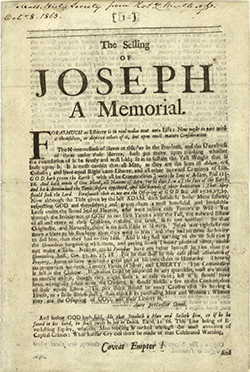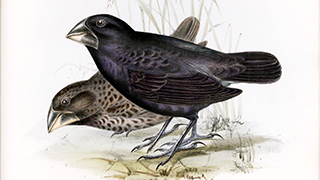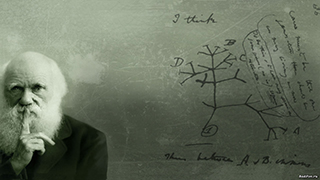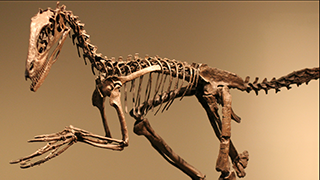MENU
The Electronic Scholarly Publishing Project: Providing access to classic scientific papers and other scholarly materials, since 1993. More About: ESP | OUR CONTENT | THIS WEBSITE | WHAT'S NEW | WHAT'S HOT
Comparative Timelines
The ESP Timeline (one of the site's most popular features) has been completely updated to allow the user to select (using the timeline controls above each column) different topics for the left and right sides of the display.
Select:
New Left Column
New Left Column
Dates
Decade
New Right Column
New Right Column
 Samuel Sewall (1652-1730) publishes The Selling of Joseph — the first American protest against slavery.
Samuel Sewall (1652-1730) publishes The Selling of Joseph — the first American protest against slavery.
Pennsylvania legalizes slavery.
1700
 Samuel Sewall (1652-1730) publishes The Selling of Joseph — the first American protest against slavery.
Samuel Sewall (1652-1730) publishes The Selling of Joseph — the first American protest against slavery.
Pennsylvania legalizes slavery.
(no entry for this year)
1701
(no entry for this year)
New York passes An Act for Regulating Slaves. Among the prohibitions of this act are meetings of more than three slaves, trading by slaves, and testimony by slaves in court.
1702
New York passes An Act for Regulating Slaves. Among the prohibitions of this act are meetings of more than three slaves, trading by slaves, and testimony by slaves in court.
Delaware separates from Pennsylvania and becomes an independent colony.
Connecticut assigns the punishment of whipping to any slaves who disturb the peace or assault whites.
Massachusetts requires those masters who liberate slaves to provide a bond of 50 pounds or more in the event that the freedman becomes a public charge.
Rhode Island makes it illegal for blacks and Indians to walk at night without passes.
Gottfried Wilhelm Leibniz invents the Binary System
1703
Connecticut assigns the punishment of whipping to any slaves who disturb the peace or assault whites.
Massachusetts requires those masters who liberate slaves to provide a bond of 50 pounds or more in the event that the freedman becomes a public charge.
Rhode Island makes it illegal for blacks and Indians to walk at night without passes.
(no entry for this year)
1704
(no entry for this year)
Massachusetts makes marriage and sexual relations between blacks and whites illegal.
New York declares that punishment by execution will be applied to certain runaway slaves.
The Virginia Slave Code codifies slave status, declaring all non-Christian servants entering the colony to be slaves. It defines all slaves as real estate, acquits masters who kill slaves during punishment, forbids slaves and free colored peoples from physically assaulting white persons, and denies slaves the right to bear arms or move abroad without written permission.
1705
Massachusetts makes marriage and sexual relations between blacks and whites illegal.
New York declares that punishment by execution will be applied to certain runaway slaves.
The Virginia Slave Code codifies slave status, declaring all non-Christian servants entering the colony to be slaves. It defines all slaves as real estate, acquits masters who kill slaves during punishment, forbids slaves and free colored peoples from physically assaulting white persons, and denies slaves the right to bear arms or move abroad without written permission.
Connecticut requires that Indians, mulattos, and black servants gain permission from their masters to engage in trade.
New York declares blacks, Indians, and slaves who kill white people to be subject to the death penalty.
1706
Connecticut requires that Indians, mulattos, and black servants gain permission from their masters to engage in trade.
New York declares blacks, Indians, and slaves who kill white people to be subject to the death penalty.
(no entry for this year)
1707
(no entry for this year)
Africans in the colony of South Carolina outnumber Europeans, making it the first English colony with a black majority.
Blacks outnumber whites in South Carolina.
Rhode Island requires that slaves be accompanied by their masters when visiting the homes of free persons.
The Southern colonies require militia captains to enlist and train one slave for every white soldier.
1708
Africans in the colony of South Carolina outnumber Europeans, making it the first English colony with a black majority.
Blacks outnumber whites in South Carolina.
Rhode Island requires that slaves be accompanied by their masters when visiting the homes of free persons.
The Southern colonies require militia captains to enlist and train one slave for every white soldier.
(no entry for this year)
1709
(no entry for this year)
ESP Quick Facts
ESP Origins
In the early 1990's, Robert Robbins was a faculty member at Johns Hopkins, where he directed the informatics core of GDB — the human gene-mapping database of the international human genome project. To share papers with colleagues around the world, he set up a small paper-sharing section on his personal web page. This small project evolved into The Electronic Scholarly Publishing Project.
ESP Support
In 1995, Robbins became the VP/IT of the Fred Hutchinson Cancer Research Center in Seattle, WA. Soon after arriving in Seattle, Robbins secured funding, through the ELSI component of the US Human Genome Project, to create the original ESP.ORG web site, with the formal goal of providing free, world-wide access to the literature of classical genetics.
ESP Rationale
Although the methods of molecular biology can seem almost magical to the uninitiated, the original techniques of classical genetics are readily appreciated by one and all: cross individuals that differ in some inherited trait, collect all of the progeny, score their attributes, and propose mechanisms to explain the patterns of inheritance observed.
ESP Goal
In reading the early works of classical genetics, one is drawn, almost inexorably, into ever more complex models, until molecular explanations begin to seem both necessary and natural. At that point, the tools for understanding genome research are at hand. Assisting readers reach this point was the original goal of The Electronic Scholarly Publishing Project.
ESP Usage
Usage of the site grew rapidly and has remained high. Faculty began to use the site for their assigned readings. Other on-line publishers, ranging from The New York Times to Nature referenced ESP materials in their own publications. Nobel laureates (e.g., Joshua Lederberg) regularly used the site and even wrote to suggest changes and improvements.
ESP Content
When the site began, no journals were making their early content available in digital format. As a result, ESP was obliged to digitize classic literature before it could be made available. For many important papers — such as Mendel's original paper or the first genetic map — ESP had to produce entirely new typeset versions of the works, if they were to be available in a high-quality format.
ESP Help
Early support from the DOE component of the Human Genome Project was critically important for getting the ESP project on a firm foundation. Since that funding ended (nearly 20 years ago), the project has been operated as a purely volunteer effort. Anyone wishing to assist in these efforts should send an email to Robbins.
ESP Plans
With the development of methods for adding typeset side notes to PDF files, the ESP project now plans to add annotated versions of some classical papers to its holdings. We also plan to add new reference and pedagogical material. We have already started providing regularly updated, comprehensive bibliographies to the ESP.ORG site.
ESP Picks from Around the Web (updated 06 MAR 2017 )
Old Science

Weird Science

Treating Disease with Fecal Transplantation
Fossils of miniature humans (hobbits) discovered in Indonesia

Dinosaur tail, complete with feathers, found preserved in amber.
Astronomy

Mysterious fast radio burst (FRB) detected in the distant universe.